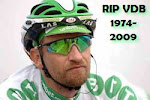Passive doping refers to the theory that “clean” sportsmen can do measurable harm to their health by overcompensating in an effort to match competitors who race with the benefit of illegal performance enhancing drugs. For many readers, the idea of passive doping conjures-up images of physical exhaustion, but the phenomena involves a psychological component as well, and it's no less serious.
Today I spoke with a good friend who competes professionally at the Pro Continental level - he is deciding who to sign with for 2011, and is considering whether or not he wants to race in Europe with a top-level team, or back in his home country. To the best of my knowledge, my friend competes drug-free, and he's never failed a doping control. And yet he's a victim of passive doping.
I revealed to my friend that one of his rivals has been up to his eyeballs in doping and is facing sanction. My friend was shocked, and he wrote to me in a text, "I'm pretty gutted over him man. I would be really hard on myself when he blew out a result."
Instead of physical pain, my friend suffered psychologically as a result of the passive doping. When his competitor achieved successes that were seemingly not possible for my friend - who is a more naturally-talented rider - my buddy assumed that he wasn't training hard enough and that he was mentally weak and lacked discipline. But in reality, the simple fact is that for years, the other rider enjoyed a 10% advantage because of EPO. But my friend was beating himself up over this.
How much anxiety and self-loathing did he experience because he was judging himself against an unreasonable standard that was impossible for him to match cleanly? That's passive doping.
Showing posts with label passive doping. Show all posts
Showing posts with label passive doping. Show all posts
Wednesday, September 08, 2010
Subscribe to:
Posts (Atom)






